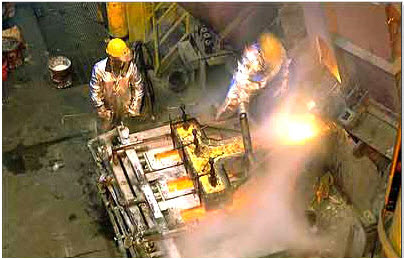Castings are necessary for the manufacture of automotive components. It is challenging to imagine the automotive industry without castings. Castings are created by pouring molten metal into a mould and letting it cool and solidify. This method makes it possible to produce intricate forms and designs that would have been difficult or impossible to manufacture using conventional production methods.
Applications
Castings for automotive are created in many different ways, a few of which are given below:
- Engine Components – Engine blocks, Cylinder heads, and other essential engine components are usually made from castings. Castings make it possible to create the intricate internal channels, precise tolerances, and complex shapes required for optimum engine performance.
- Transmission Housings – Castings are also used to create transmission housings, which protect and enclose the transmission. As transmission housings must be sturdy, durable, and able to withstand high temperatures and pressures, castings are a fantastic material choice.
- Suspension Components – Castings are widely used to produce suspension parts such as control arms, spindles, and steering knuckles. They must also be able to support heavy loads and endure repeated stress and strain, so castings are a fantastic alternative for their manufacturing.
- Wheels – In the casting process for car wheels, aluminium and other alloys that offer strength and durability while still being lightweight are widely employed. Castings allow for the creation of intricate wheel designs that could be customized to meet the needs of diverse clients and automobiles.
- Brakes – Callipers and rotors are two braking parts typically made using castings. Building complex elements like internal cooling fins and brake fluid channels, essential for optimum braking performance, is made possible by castings.
Role of Castings for Automotive
Castings are an essential component of modern cars due to their important role in the automotive industry and the several benefits they provide.
For the following reasons, casting is significant in the automotive industry:
- Strength: Because of its high strength and ability to withstand heavy loads and stress, castings are fantastic for automotive parts, including cylinder heads, engine blocks, and gearbox cases.
- Durability: Castings are ideal for items like exhaust manifolds and brake components that must withstand demanding conditions since they are robust and resistant to wear and tear.
- Cost-Effectiveness -Castings are a fantastic choice for high-volume production operations because they can be produced quickly and affordably. It is essential in the automotive industry since there is a massive demand for consistent, high-quality parts produced in large quantities.
- Complex Shapes and Designs- The creation of complex shapes and designs that would be difficult or impossible to manufacture using other manufacturing techniques is made possible by castings. Therefore, producing solid, long-lasting, highly efficient, and well-suited components to the application for which they are designed is possible.
- Customization – Castings can be altered to meet the particular needs of individual clients and vehicles. As a result, producers can create parts expressly for specific applications, such as high-performance engines or heavy-duty suspension systems.
- Efficiency – Castings might have intricate internal channels and other features to optimize performance and reduce waste. It is essential in the automotive industry, where efficiency is critical to reducing emissions and improving fuel economy.
Conclusion
Castings play a significant role in the automotive industry by providing a wide range of essential components with durability, strength, customization, and efficiency. As the automotive industry evolves and the need for high-quality, efficient components grows, the relevance of castings will only grow. Castings are critical to the automotive industry, which cannot be overstated. Castings for Automotive are necessary for modern cars’ operation, security, plus dependability, from engine parts to suspension components. The importance of castings will only grow as the automotive industry develops and demand for efficient, high-quality parts increases. Castings are ultimately a critical aspect of the automotive industry because they provide a variety of essential components with durability, strength, and diversity.

